英语语法:虚拟语气
(完整版)英语虚拟语气语法归纳总结
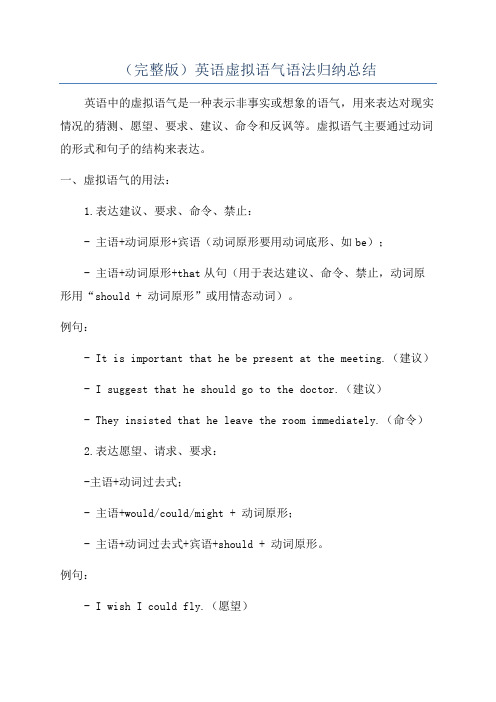
(完整版)英语虚拟语气语法归纳总结英语中的虚拟语气是一种表示非事实或想象的语气,用来表达对现实情况的猜测、愿望、要求、建议、命令和反讽等。
虚拟语气主要通过动词的形式和句子的结构来表达。
一、虚拟语气的用法:1.表达建议、要求、命令、禁止:- 主语+动词原形+宾语(动词原形要用动词底形、如be);- 主语+动词原形+that从句(用于表达建议、命令、禁止,动词原形用“should + 动词原形”或用情态动词)。
例句:- It is important that he be present at the meeting.(建议)- I suggest that he should go to the doctor.(建议)- They insisted that he leave the room immediately.(命令)2.表达愿望、请求、要求:-主语+动词过去式;- 主语+would/could/might + 动词原形;- 主语+动词过去式+宾语+should + 动词原形。
例句:- I wish I could fly.(愿望)- I would appreciate it if you could help me.(请求)3.表示虚拟条件:- If条件从句中的谓语动词用过去完成时,主句用would/should/might/could + have + 过去分词;- If条件从句中的谓语动词用过去时,主句用would/should/could + 动词原形。
例句:- If I had known his phone number, I would have called him.(虚拟条件)- If you had listened to me, we could have finished the project earlier.(虚拟条件)4.表达建议、要求、祝愿:- If only内部称述 + 主语 + 过去式。
英语语法总结虚拟语气
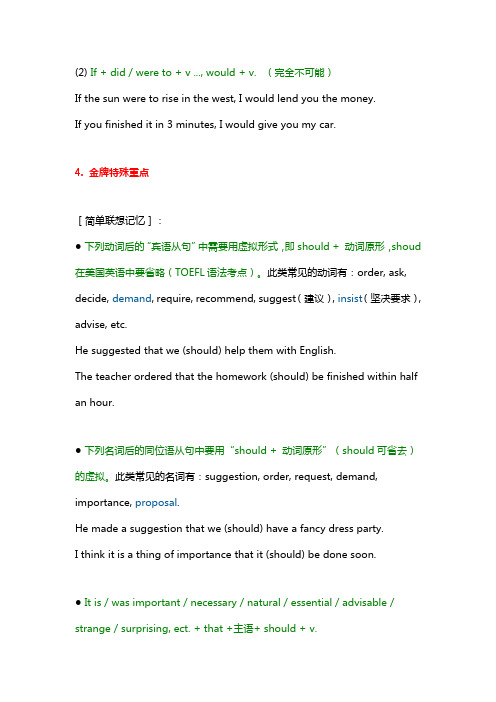
英语语法总结虚拟语气虚拟语气用来表达不可能或难以实现的愿望,与事实相反的假设,通常分为基本的三种形式。
1. 与现在事实相反的虚拟:If + did / were + ..., ... would/ should/ could/ might + do (动词原形)If I were you, I would go abroad at once. (I am not you.)If he knew it now, he could help me. (He doesn't know it now.)2. 与过去事实相反的虚拟:If + had done + ..., ... would (might) have done ...If I had known your telephone number yesterday, I would have phoned you. (I didn't know your telephone number.)If you had come here a little earlier just now, you might have met her. (You didn't come here earlier.)3. 与将来事实相反的虚拟:(1) If + should + v., ... would + v. (可能性很小)(译作“万一”)If it should rain tomorrow, you could stay at home.If I should fail, what should Ido?(2) If + did / were to + v ..., would + v. (完全不可能)If the sun were to rise in the west, I would lend you the money.If you finished it in 3 minutes, I would give you my car.4. 金牌特殊重点[简单联想记忆]:●下列动词后的“宾语从句”中需要用虚拟形式,即should + 动词原形,shoud 在美国英语中要省略(TOEFL语法考点)。
高三英语虚拟语气知识点
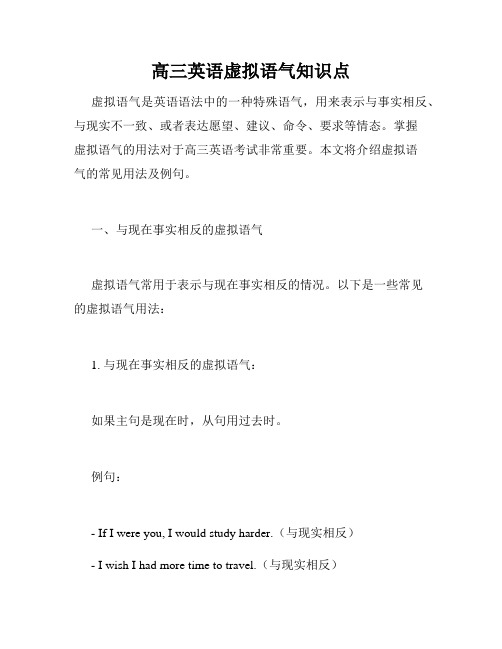
高三英语虚拟语气知识点虚拟语气是英语语法中的一种特殊语气,用来表示与事实相反、与现实不一致、或者表达愿望、建议、命令、要求等情态。
掌握虚拟语气的用法对于高三英语考试非常重要。
本文将介绍虚拟语气的常见用法及例句。
一、与现在事实相反的虚拟语气虚拟语气常用于表示与现在事实相反的情况。
以下是一些常见的虚拟语气用法:1. 与现在事实相反的虚拟语气:如果主句是现在时,从句用过去时。
例句:- If I were you, I would study harder.(与现实相反)- I wish I had more time to travel.(与现实相反)2. 表达建议、要求或命令等的虚拟语气:主句用“should”或“ought to”引导,从句用动词原形。
例句:- It is necessary that she should arrive on time.(建议)- He demanded that they leave immediately.(命令)二、与过去事实相反的虚拟语气虚拟语气还可以用来表示与过去事实相反的情况。
以下是一些常见的虚拟语气用法:1. 与过去事实相反的虚拟语气:如果主句是过去时,从句用过去完成时。
例句:- If he had studied harder, he would have passed the exam.(与过去事实相反)- I wish I hadn't eaten so much.(与过去事实相反)2. 表达愿望、建议或命令等的虚拟语气:主句用“should”或“ought to”引导,从句用动词原形或过去时。
例句:- It is high time that he applied for a job.(建议)- I wish he would stop talking.(愿望)三、与将来事实相反的虚拟语气虚拟语气还可以用来表示与将来事实相反的情况。
以下是一些常见的虚拟语气用法:1. 与将来事实相反的虚拟语气:如果主句是将来时,从句用过去完成时。
英语虚拟语气的三种时态
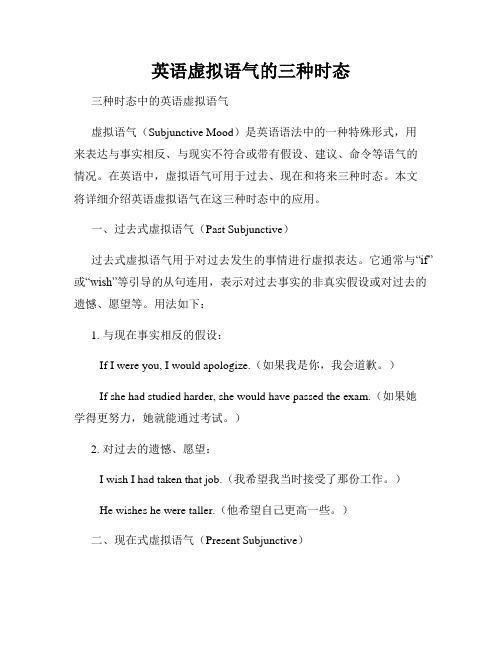
英语虚拟语气的三种时态三种时态中的英语虚拟语气虚拟语气(Subjunctive Mood)是英语语法中的一种特殊形式,用来表达与事实相反、与现实不符合或带有假设、建议、命令等语气的情况。
在英语中,虚拟语气可用于过去、现在和将来三种时态。
本文将详细介绍英语虚拟语气在这三种时态中的应用。
一、过去式虚拟语气(Past Subjunctive)过去式虚拟语气用于对过去发生的事情进行虚拟表达。
它通常与“if”或“wish”等引导的从句连用,表示对过去事实的非真实假设或对过去的遗憾、愿望等。
用法如下:1. 与现在事实相反的假设:If I were you, I would apologize.(如果我是你,我会道歉。
)If she had studied harder, she would have passed the exam.(如果她学得更努力,她就能通过考试。
)2. 对过去的遗憾、愿望:I wish I had taken that job.(我希望我当时接受了那份工作。
)He wishes he were taller.(他希望自己更高一些。
)二、现在式虚拟语气(Present Subjunctive)现在式虚拟语气用于对现在或将来的事情进行虚拟表达。
它通常与“if”或“suggest”等引导的从句连用,表示对现实的非真实假设、建议或要求。
用法如下:1. 对现在事实相反的假设:If it were to rain, we would stay at home.(如果下雨的话,我们将呆在家里。
)I suggest that he be more careful.(我建议他更加小心。
)2. 对现在的建议或要求:It is important that she arrive on time.(她准时到达是很重要的。
) They demanded that he pay the bill immediately.(他们要求他立即支付账单。
英语语法:虚拟语气
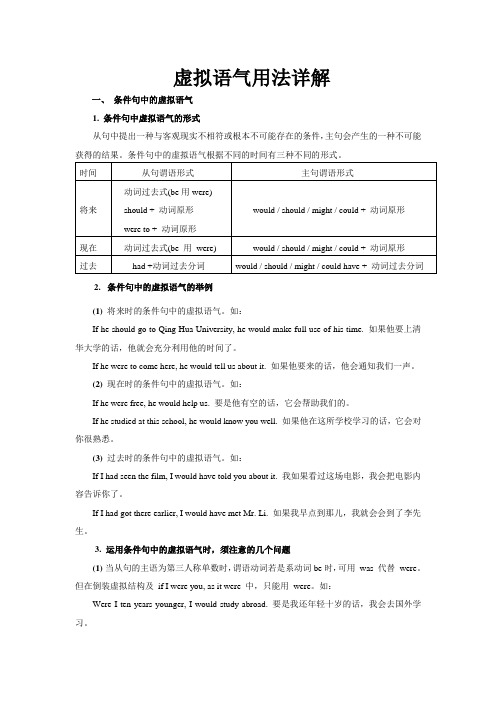
虚拟语气用法详解一、条件句中的虚拟语气1. 条件句中虚拟语气的形式从句中提出一种与客观现实不相符或根本不可能存在的条件,主句会产生的一种不可能获得的结果。
条件句中的虚拟语气根据不同的时间有三种不同的形式。
2.条件句中的虚拟语气的举例(1) 将来时的条件句中的虚拟语气。
如:If he should go to Qing Hua University, he would make full use of his time. 如果他要上清华大学的话,他就会充分利用他的时间了。
If he were to come here, he would tell us about it. 如果他要来的话,他会通知我们一声。
(2) 现在时的条件句中的虚拟语气。
如:If he were free, he would help us. 要是他有空的话,它会帮助我们的。
If he studied at this school, he would know you well. 如果他在这所学校学习的话,它会对你很熟悉。
(3)过去时的条件句中的虚拟语气。
如:If I had seen the film, I would have told you about it. 我如果看过这场电影,我会把电影内容告诉你了。
If I had got there earlier, I would have met Mr. Li. 如果我早点到那儿,我就会会到了李先生。
3. 运用条件句中的虚拟语气时,须注意的几个问题(1)当从句的主语为第三人称单数时,谓语动词若是系动词be时,可用was 代替were。
但在倒装虚拟结构及if I were you, as it were 中,只能用were。
如:Were I ten years younger, I would study abroad. 要是我还年轻十岁的话,我会去国外学习。
If I were you, I would try my best to grasp the chance. 要是我是你的话,我要尽力抓住这次机会。
英语语法之虚拟语气大全

2、If only引起的感叹句相当于“How I wish+宾 语从句”:
If only he could come! 他要能来就好了。 If only I were ten years younger. If only I had known the answer! 我要早知答案就好了。
虚拟语气用在某些动词后面
另外,由第一类动词转换为名词或过去分词后,他们所带的主语从句、表语从句 或同位语从句的虚拟与宾语从句的谓语动词一样,如:
主语从句:It is suggested that we should discuss the question. 表语从句:His suggestion is that we should discuss the question. 同位语从句:The suggestion that we should discuss the question was
If it should rain tomorrow, we would stay at home. If I were to go to the moon one day, I could see it with my own eyes. If you missed the film to night, you would feel sorry.
4. 从句的动作与过去事实相反, 主句的动作与现在事实不符时
基本句型为 if +had done, 主句+would/could/should+do.
If you had studied English hard, you could speak English now. If you had bought that house, you would be rich now.
英语语法—虚拟语气(最全)
虚拟语气1.虚拟语气的概念虚拟语气把动作当作一种只存在于讲话人想象中的“假设”或“推测”,而不是当作客观现实中的真实事件。
它表达的是建议、不满、怀疑、忧虑、推测、假设、想象、祝愿等。
2.虚拟语气用于非真实条件句英语中的条件句有两种:真实条件句和非真实条件句。
真实条件句实现的可能性非常大,常用if, unless, as long as, so long as, once等引导,谓语动词常用陈述语气;非真实条件句常表示不能实现或纯假象的情况,谓语动词要用虚拟语气。
非真实条件句包括虚拟条件句、推测条件句、错综时间条件句。
①虚拟条件句、推测条件句虚拟条件句可分为两类:一类是叙述与现在事实相反的情况,一类是叙述与过去事实相反的情况。
另外,还有一类用于推测将来的情况,也称作推测条件句。
从句中提出一种与客观现实不相符或根本不可能存在的条件,主句会产生一种不可能获得的结果。
句中的虚拟语气根据不同的时间有3种不同的形式:I would lend him the money if he asked me.他要是问我,我愿意借钱给他。
(意愿)If he had time, he should do it.要是有时间,他愿意做那件事。
(意愿)He could move the big stone if he should try.努力的话,他能搬动那块大石头。
(能力)If he forgot to come, you could go instead.他要是忘了没来,你可要替他来。
(许诺)A.与现在事实相反If I had enough money, I would buy a computer.如果我有足够的钱,我将买一台电脑。
(实际上没有) Were I you I would refuse.如果我是你我会拒绝。
(我不是你)注:从句有时可用If it were not for这种句型,表示“若不是……”。
It it weren’t for your help, we would be in serious trouble.若不是你帮忙,我们会遇到大麻烦。
虚拟语气用法
虚拟语气用法虚拟语气,又称“虚拟假设语气”,是指说话者或写作者在表达某种情况时,通过使用特定的语法形式来表示这种情况实际上并不存在或者与事实相反。
虚拟语气在英语中非常常见,它可以用来表达假设、愿望、建议、命令、推测等多种语境。
本文将介绍虚拟语气的各种用法及例句。
一、假设与现实相反的情况虚拟语气常用于表示与现实相反的情况或假设。
在这种情况下,谓语动词常以“would/could/should + 动词原形”或“were + 主语”等形式出现。
1. 虚拟语气用于假设:If I were rich, I would travel around the world.如果我有钱,我会环游世界。
If she had studied harder, she could have passed the exam.如果她学得更努力,她本来可以通过考试的。
2. 虚拟语气用于愿望:I wish I were taller.我希望我更高一些。
I wish you wouldn't be late for the meeting.我希望你不要迟到开会。
3. 虚拟语气用于建议:I suggest that he should see a doctor.我建议他去看医生。
It is recommended that every student study English.建议每个学生都学习英语。
二、与过去事实相反的情况虚拟语气还常用于表示与过去事实相反的情况。
在这种情况下,主要使用“had + 过去分词”形式或其他相应的虚拟语气结构。
1. 虚拟语气用于与过去事实相反的条件:If he had arrived earlier, he would have caught the train.如果他早点到,他就能赶上火车了。
If I had known you were coming, I would have prepared dinner.如果我知道你要来,我就会准备晚餐了。
英语语法虚拟语气
• 三.名词性从句中的虚拟语气
• 1.在表示建议、命令、要求、忠告等动词的后面的宾语从句中的虚拟 语气. 由于这些动词本身隐含说话者的主观意见,认为某事应该或不应该怎 样,这些词语后面的“that”从句应用虚拟语气,且均以“should+ 动词原形”表示这种语气 • 例(2012)My boss ordered that the legal docments be sent to him before lunch. • 析.Order后面接宾语从句,从句谓语动词用虚拟语气。 • 2. would rather , would sooner,had rather, would (just) as soon ,would prefer之后的宾语从句中的虚拟ห้องสมุดไป่ตู้气would rather , would sooner, had rather, would (just) as soon,would prefer (希望)也用来表达主观愿望,它们之后的宾语从句中需用虚拟语气。 谓语动词用过去式表示现在或将来,用过去完成式表示与过去事实相 反。 • 例 (2011)It is getting late.I would rather you left now. • 析.would rather 表示宁愿,其后跟的从句中,用虚拟语气,谓语动 词用过去式。
一.
什么是虚拟语气?
虚拟语气:表示动作或状态不是客观存在的事实,而是说话人的主观愿望、假设或推测等
二.主语从句中的虚拟语气
1.“It is (was)+形容词(或过去分词)+that……”结构中的虚拟语气 在形如“It is (was)+形容词(或过去分词)+that……”结构中,使用某些表示愿 望、建议、请求、命令、可能、适当、较好、迫切、紧近、重要等形容词后的主 语从句的谓语也用虚拟语气。其表达形式为should +动词原形或省略should直 接用动词原形(美国英语中省去should) 例1 (2010)It is necessary that he hand in the assignment without delay. 析:形容词为necessary,important,impossible,strange,natural,essential等时,在 It is (was)+形容词(或过去分词)+that……”结构中,主语从句要用虚拟语气。Should 可省略。 例2(2006)It is imperative that the government attract more investment into the shipbuilding industry. 析: It is (was)+形容词(或过去分词)+that……,使用某些表愿望、建议、命令等形容 词后的主语从句,谓语要用虚拟语气,should+动词原形。
英语语法虚拟语气
虚拟语气英语动词有四种语气:陈述语气、祈使语气、疑问语气和虚拟语气。
一.定义:虚拟语气是一种动词形式,表示说话人的一种愿望,假设,怀疑,猜测,建议等含义。
虚拟语气所表示的含义不是客观存在的事实。
二.虚拟语气在非真实条件句中1.概念真实条件句:表示现实或可能变为现实的条件。
非真实条件句:表示非现实的,或不可能,或不大可能变为现实的条件。
e.g. ①They don’t have a meeting if there is nothing to discuss.②If I had time,I would study German.2.形式e.g. ①If you had got up earlier,you could have caught the train.②If he came tomorrow,we could ask him.练习:①If you ____(take) my advice,you ______(not fail) in the exams last term.②If it ____(rain) tomorrow,the sports meeting ______(put off).③If everyone ____(know)first aid,many lives ______(save).3.重点1)如条件句中有were,had,should,可把if省略掉,把were,had,should提前,变为倒装句式。
e.g. If we had made a great effort,we might have succeeded.→Had we made a great effort,we might have succeeded.▲注意:若条件句的谓语动词是否定形式时,不能用动词的缩略形式。
e.g. If it weren’t for the expense,I would go abroad now.→Were it not for the expense,I would go abroad now.2)有些句子主句谓语和从句谓语表示的动作在时间上并不一致,这类句子称为“错综时间条件句”。
- 1、下载文档前请自行甄别文档内容的完整性,平台不提供额外的编辑、内容补充、找答案等附加服务。
- 2、"仅部分预览"的文档,不可在线预览部分如存在完整性等问题,可反馈申请退款(可完整预览的文档不适用该条件!)。
- 3、如文档侵犯您的权益,请联系客服反馈,我们会尽快为您处理(人工客服工作时间:9:00-18:30)。
to the
A. went
B. have been
C. had been D. would go
【分析】 通过if从句中谓语动词“I were”可判断出,该句是与现在事实相 反的虚拟条件句。主句用“would+动 词原形”。故选答案D。
精品课件
例2 The doctor proposed that my
It is strange that he(should) say so. 真遗憾,你失去了这么好的机会。 It is a pity that you(should) miss a good chance. 已经决定了把运动会推迟至下个月。
It has been decided that the sports meet(should)be put off till next month.
The Subjunctive
Mood虚拟语 件 从 句
主句
与过去事 实相反
had+动词过去 分词
would(should, could,might)
+ have +动词
与现在事
实相反 过去式(be用
过去分词 would(should,
were)
could,might)
与将来 过去式/should +w动o词uld原形
事实相反 +动词原形/
(should,
were to+动词原 could, might)
形
精品课件
+动词原形
2、虚拟语气在宾语从句中的用法
(1)在动词wish后的宾语从句中,表示与现 在或过去的事实相反,或对将来的主观愿望, 从句通常省略连词that。
精品课件
高中学生掌握一门外语很有必要。 It is necessary that a high school student should master a foreign language.
精品课件
虚拟语气在表语从句和同位语从 句的用法
在suggestion, proposal, order, idea, news, request,advice, demand, plan 等名词后面的表语 从句中的谓语动词用should+动词 原形,should常省略。
+that…;
③ It is a pity
( no wonder…) + that… 等结构后的主
语从句中的谓语动词用should +动词原形,
s例ho: uItldis常d被es省ir略ed。that we(should) get
everything ready by tonight. 精品课件
他那样说话,令人吃惊。
精品课件
Revision :
1. He is not a pilot, but he wishes hweer______ (be).
2. Iewish I _h__a_d__m__e__t_(meet)him yesterday.
3. I wish it _w__o_u__l_d___(be) fine tomorrobwe.
4.( Hsheoourldde)rebde the work st_a__r_t_e_d__________s_ta(syteadrt) at once.
5. I’d rather you _________(stay) at home all day t精o品课d件ay.
D、试题详解
例1 、If I were you, I cinema with her.(96)
1)表示对现在情况的虚拟:从句动词用过去 式或过去进行式(be动词一般用were)。 2)表示对过去情况的虚拟:从句动词常用 “had+过去分词”或 “would, could, might +have done” 。
(2) 在主语+would rather +that 宾语从句 中,从句谓语用过去式表示现在或将来,用过去 完成式表示与过去事实相反 。
精品课件
虚拟语气在主语从句中的用法
① It is desired (suggested requested,
ordered, demanded…) + that…;
② It is strange (necessary, possible,
important, surprising,natural…)
brother
his right hand.(97)
A.avoid to use B. should avoid to use
C. avoid using D. avoided using
【分析】 该题有两个考点,一是 propose后的宾语从句要用虚拟语气 动词形式,二是avoid一词后要用动名 词作宾语。故选C。
精品课件
例3 Had you not helped me with my English, I to pass the final examination.
A. might fail B. might have failed
C. shall fail D. would fail
【分析】 当if从句中有were, should和 had等词时,可以省略if, 同时把were, should, had放到主语前面形式倒装。从句 中的had…not helped表明该句是与过去 事实相反的假设,因此要选B。
精品课件
例 My suggestion is that we (should) do the experiment again.
我的想法是在接受前仔细想想。
My idea is that we should think it over before accepting it.
精品课件
(3) 在表示提议、要求、命令、决定等 动词如suggest, decide, require, request, demand, propose, insist, order等)后的宾语从句中谓语动词常用 “should+动词原形”。Should常被省 略。
一个坚持(insist),两个命令(order, command),三个建议( suggest, advise, propose),四个要求 ( ask,demand request, require)
